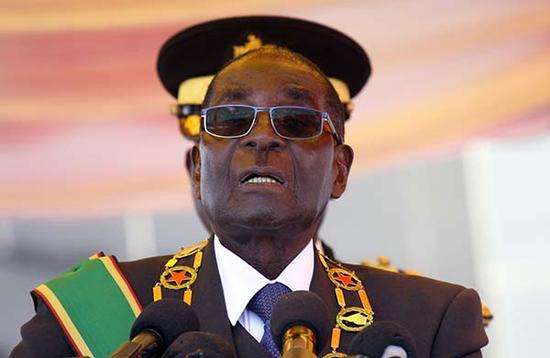(单词翻译:单击)
听力文本
The Legacy of Zimbabwean Leader Robert Mugabe
Robert Mugabe became the leader of the newly named country of Zimbabwe in 1980. That year, the nation won its long fight against British colonialism. The formerly white-ruled Rhodesia and its new leader quickly became the pride of southern Africa. Its farm economy was so successful that it became known as the "breadbasket" of the area.
But white people, who were 5% of the population, owned nearly 75% of agricultural land. In trying to solve this problem, a once well-respected Mugabe government changed. Over almost 40 years as its leader, Mugabe's rule became widely considered corrupt and murderous.
The former president died on Friday at the age of 95, two years after being forced to give up power.
Amnesty International says that he left behind a non-removable "stain on his country's human rights record."
The human rights group said Mugabe's early years as a leader saw national improvements in health care and education. But as he grew at ease with power, his government began murdering political dissidents. His land reform program was deeply corrupted as well. This led to the collapse of the Zimbabwean economy.
Muleya Mwananyanda is Amnesty International's Deputy Regional Director for Southern Africa. He said Mugabe caused "lasting damage" for Zimbabwe's people.
In 2008, the country experienced a hyperinflation that rose above 500 billion percent.
Those living in the capital city of Harare now find themselves in some of the worst conditions of their lives. There is no running water. There are long lines to buy very costly bread. Millions have emigrated from the country over the years.
"We were promised Canaan," Dadirai Tsvakai of Harare told The Associated Press earlier this year. "But this is hell," he said.
Land reform
Mugabe and many others believed land reform was required to fully end Zimbabwe's racist colonial past. At the time of the country's liberation, a small number of wealthy, white farmers owned 75% of the country's farmland. But the president's plan became a lawless move to gain power and wealth for himself, his family and his political supporters
At first, white farmers refused to sell their land when the government did not offer full value. Land reform stalled.
Members of the pro-Mugabe War Veterans Association started to seize white-owned farms under what came to be known as the "Fast-Track Land Reform Programme."
For the economy, it was the beginning of the end.
Over the next years, the economy fell 40 percent. Zimbabwean money became worthless. Foreign investment fled.
The land seizures resulted in 8 million hectares of land - 20% of Zimbabwe's area – moving to more than 160,000 small, inexperienced farm families.
Many of the most profitable farms were given to important politicians and their families, including Mugabe's wife, Grace. None was an experienced agricultural expert.
Recent studies have suggested agriculture is getting back to mid-1990s level. About 33% of new, black farmers have become "serious" industrial-sized farmers.
Mugabe removed
Mugabe's army ousted him from office in 2017. Emmerson Mnangagwa took power. For a short time, many thought he would lead Zimbabwe's recovery.
But less than a year later, Mnangagwa ordered the military to act against activists who were protesting the country's election. Armed forces shot and killed six protestors.
"Whether we are talking about human rights or the economy, it is as if Mugabe never left. The only change has been for the worse," said Harare-based political expert Alexander Rusero.
"Life was not that good, but it was never this bad," said one man on the streets of Harare Friday morning.
I'm Susan Shand.
重点解析
1.human rights 人权
The essence of the problem of modernity is the human rights and obligation.
现代性问题的实质是人的权利和责任问题。
2.get back to 重新回到
Could you get back to me in an hour?
可以请您一小时内再打给我吗?
3.be known as 被称为
He is known as an artist.
他作为一位艺术家而知名。
4.running water 自来水
Some have no sewerage or running water.
有些人家里没有下水道或者自来水。
5.For a short time, many thought he would lead Zimbabwe's recovery.
For a short time 短期内
They only stayed for a short time.
他们只呆了一小会儿。
It is extremely important to study for a short time every day.
每天花一点时间学习是很重要的。
6.At the time of the country's liberation, a small number of wealthy, white farmers owned 75% of the country's farmland.
At the time of 在...的时候
He was sane at the time of the murder.
在凶杀案发生时他的神志是清醒的。
She was only twelve at the time of liberation.
解放那时节她才十二岁。
参考译文
津巴布韦前总统穆加贝逝世
1980年,罗伯特·穆加贝(Robert Mugabe)成为新成立的津巴布韦的领导人。这一年,该国在反英国殖民的长期斗争中取得了胜利。此前由白人统治的罗得西亚及其新任领导人很快成为非洲南部的骄傲。该国的农业经济很成功,被誉为非洲南部地区的“粮仓”。
但是,该国约75%的农业用地掌握在人口仅占5%的白人手中。为了解决这一问题,曾备受爱戴的穆加贝政府进行了改革。在穆加贝担任总统的近40年里,他的统治被普遍认为充斥着“腐败”和“谋杀”。
前总统穆加贝于周五逝世,享年95岁,两年前他被迫下台。
国际特赦组织称,他在“国家人权记录上留下了无法抹去的污点”。
该人权组织说,穆加贝担任总统的头几年,全国的医疗保健和教育都有所改善。但随着他大权在握,他的政府开始谋杀持不同政见者。他的土地改革计划也出现严重腐败。这导致了津巴布韦经济的崩溃。

Muleya Mwananyanda是国际特赦组织南部非洲地区副主任。他说,穆加贝给津巴布韦人民造成了“永久性伤害”。
2008年,津巴布韦经历了一次恶性通货膨胀,通货膨胀率超过了5000亿。
生活在首都哈拉雷的居民发现他们的生活条件糟糕透顶。没有自来水。面包昂贵且需要排长队抢购。多年来,数以百万计的人移居国外。
今年早些时候,哈拉雷市的Dadirai Tsvakai告诉美联社:“他们许我们希望之地。”“但却让我们身陷地狱,”他说。
土地改革
穆加贝和其他许多人认为,想彻底结束津巴布韦的种族主义殖民历史,必须进行土地改革。在独立初期,少数富裕的白人农民拥有全国75%的农业用地。但是,总统的改革计划成为非法的举动,旨在为其自身、家人和他的政治支持者攫取权力和财富。
起初,当政府无法提供满意的报价时,白人农民拒绝出售手中的土地。土地改革计划停滞不前。
支持穆加贝的退伍军人协会成员开始根据“快速土地改革计划”没收白人拥有的农场。
对经济来说,这是崩溃的开端。
在接下来的几年里,该国经济下滑了40%。津巴布韦货币变得一文不值。外资纷纷撤离。
没收的800万公顷土地(津巴布韦面积的20%)转移到16万多户缺乏经验的小农户手中。
许多最赚钱的农场被重要政客和其家属瓜分,包括穆加贝的妻子格雷斯(Grace)。他们都不是经验丰富的农业专家。
最近的研究显示,农业正退回至上世纪90年代中期的水平。大约33%的新兴黑人农民成为“正儿八经”的工业化农民。
穆加贝下台
2017年,穆加贝被军方赶下台。埃默森·姆南加古瓦掌权。短期内,许多人认为姆南加古瓦会领导着津巴布韦复苏。
但还不到一年,姆南加古瓦就命令军方打压那些抗议该国选举的活动人士。武装部队击毙了6名抗议者。
“不管我们谈论人权还是经济,穆加贝仿佛从未离开过。哈拉雷的政治专家亚历山大·鲁塞罗说:“唯一的改变是形势每况愈下”。
周五早上,哈拉雷街头的一名男子称:“以前的生活不至于多美好,但却没有这么糟糕过。”
苏珊·尚德为您播报。
译文为可可英语翻译,未经授权请勿转载!


